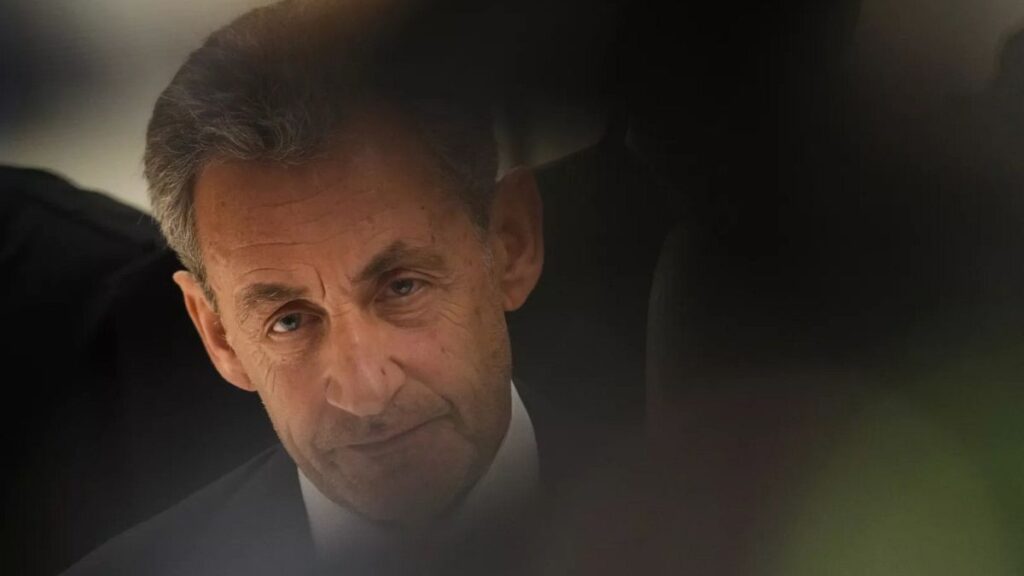Former French President Nicolas Sarkozy was found guilty on Thursday of criminal conspiracy in a long-running case alleging that he sought illegal financing from late Libyan dictator Muammar Gaddafi to secure his 2007 election victory.
The Paris court handed Sarkozy a five-year prison sentence, a €100,000 fine and a five-year ban on holding public office.
In a shocking twist, 70-year-old Sarkozy was also given a deferred detention order with immediate effect.
He must appear before prosecutors by 13 October to be notified of when his imprisonment will begin. His incarceration must start within a maximum period of four months.
Under French law, this measure applies even if he appeals. Because of his age, however, he can request conditional release.
However, the court acquitted him of passive corruption, embezzlement of Libyan public funds and illegal campaign financing, concluding that prosecutors had failed to prove Libyan money directly flowed into Sarkozy’s campaign.
The conspiracy charge, the court explained, stemmed from Sarkozy’s involvement in a group that prepared a corruption offence between 2005 and 2007.
The chief judge noted that Sarkozy allowed his close associates to approach Libyan officials “to obtain or try to obtain financial support in Libya for the purpose of securing campaign financing.”
However, the judge concluded they could not determine with certainty that Libyan money was ultimately used to pay for the campaign.
Sarkozy vows to fight on
After the sentencing, Sarkozy told journalists the ruling was “of extreme gravity for the rule of law” and said he would appeal.
“I will take responsibility. I will comply with the summons of justice. And if they absolutely want me to sleep in prison, I will sleep in prison. But with my head held high. I am innocent,” he declared.
Reactions were sharply divided. On the left, many seized the chance to mock the former leader.
Green MP Benjamin Lucas quipped, “In the end, Sarkozy got his new five-year term,” referring to the length of a presidential mandate in France.
On the right, the verdict was slammed as disproportionate. Conservative Les Républicains party senator Stéphane Le Rudulier called it “a tsunami of shame” and urged President Emmanuel Macron to pardon Sarkozy.
Far-right figurehead Marine Le Pen warned that the ruling set a dangerous precedent by imposing immediate enforcement despite appeal rights.
Marine Le Pen was herself found guilty earlier this year of misappropriating EU public funds in the case involving parliamentary assistants for her party The National Front, now called the National Rally.
A long-running and sprawling case
The ruling also concerned 11 co-defendants, including three of Sarkozy’s former ministers.
Businessman Ziad Takieddine, considered a key intermediary and one of Sarkozy’s most vocal accusers, died in Beirut earlier this week at the age of 75, never standing trial.
Another intermediary, Alexandre Djouhri, along with other figures linked to Gaddafi’s inner circle, were also implicated.
Muammar Gaddafi, Libya’s longtime dictator, was toppled and killed in an uprising in 2011, ending his four-decade rule of the North African country.
The three-month trial examined a wide range of evidence, from trips to Tripoli to suspicious offshore transfers.
Judges also reviewed claims that Sarkozy’s government had shielded Gaddafi’s former chief of staff, Bechir Saleh.
Prosecutors alleged that Sarkozy and his associates forged a corruption pact with the Gaddafi regime in exchange for campaign financing.
The pact reportedly included promises to rehabilitate Libya’s international standing and grant leniency to Abdallah Senoussi, Gaddafi’s brother-in-law, who had been convicted in France for his role in a 1989 airline bombing over Niger that killed 170 people.
But the court dismissed a key piece of evidence that was revealed in 2012 by French investigative journal Mediapart: a document signed by Gaddafi’s former intelligence chief, Moussa Koussa, which suggested €6.5 million had been sent for Sarkozy’s campaign. Judges said the document “now appears more likely” to be forged.
Political and legal fallout
The verdict further complicates Sarkozy’s growing list of legal challenges. On 8 October, France’s highest court will review his appeal in the Bygmalion case, which saw him sentenced to one year in prison for overspending on his failed 2012 re-election bid.
He has also been convicted in the so-called Bismuth case, involving corruption and influence peddling.
Between January and May, the former head of state had to wear an electronic ankle bracelet, an unprecedented punishment for a former president.
He has lodged an appeal for that case with the European Court of Human Rights.
Read the full article here

